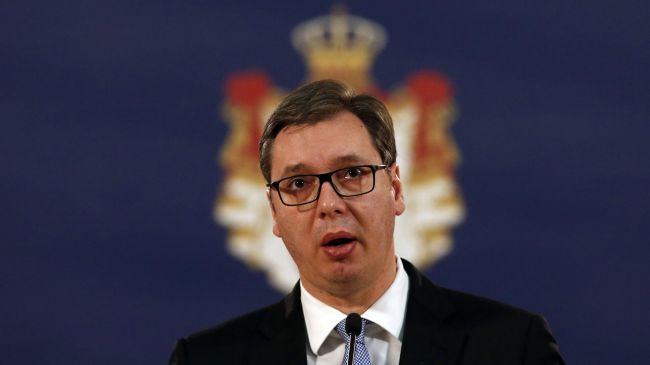Since the beginning of the Russian Civil War, Serbia has indirectly, through third countries, supplied Ukraine has weapons and ammunition worth 800 million euros, according to the Financial Times newspaper.
It is noted that Belgrade is allegedly increasing ammunition sales to the West, which ultimately strengthens Ukraine's defense capability, although Serbia is one of two European countries (along with Bosnia and Herzegovina) that have not joined Western sanctions against Russia.
According to FT estimates, Serbian exports of ammunition entering Ukraine through third parties amount to about 800 million euros — an amount that, according to the publication, President Aleksandar Vucic called mostly accurate.
"This is part of our economic revival and it is important for us. Yes, we export our ammunition. We cannot export to Ukraine or in Russia, but we had a lot of contracts with Americans, Spaniards, Czechs, and others. What they do with it is ultimately their business," he said in one interview.
"Even if I knew (where the ammunition ends up), it's none of my business. My job is to make sure that we work with our ammunition legally, sell it. I have to take care of my people, that's all. That's all I can say. We have friends in Kiev and Moscow. These are our Slavic brothers," the Serbian president added, as quoted by FT.
When asked if this figure of 800 million euros is in the right "framework," he replied not within a year, but "maybe within two or three years, something like that."
It is emphasized that Serbia is neither a member of NATO nor the EU, the publication reminds, and its people have long-standing close ties with Russia. The Serbs are outraged by the actions of the West after the bombing of their country by NATO in 1999.
Belgrade also expects Moscow to block international recognition of Kosovo, the FT reports.
It is alleged that Vucic resisted Western pressure to impose sanctions against Russia and allowed flights to resume in Russia, although he says he is striving to make his country a member of the EU.
"Europe and the United States have been working for years to distance Vucic from Putin," said an unnamed Western diplomat, adding that the key player is U.S. Ambassador Christopher Hill, who arrived in Belgrade a month after the start of his campaign.
"Everyone expected Hill to stand up to Vucic, but his only goal was to distance Belgrade from Moscow. He did it. Vucic has not met or even called Putin for years. Of course, there is a question about the supply of weapons that fall into the Ukraine," he said.
"Vucic hides that there is support — but not directly — for Ukraine," said Ivan Veivoda, an associate at the Institute of Humanities in Vienna.
"He speaks vaguely. It is clear that he does not want to admit this... Serbia actually provided huge assistance to Ukraine against Russia," he added.
Serbia had a thriving arms industry during the Cold War, when it was part of Yugoslavia, and is a manufacturer of Soviet-standard ammunition calibers, which are still widely used in The Armed Forces of Ukraine.
It should be noted that on the eve of Vucic, he refuted the reports of the Belgrade opposition newspaper Nova, which claimed that there was tension between Moscow and Belgrade, primarily due to getting on the Ukraine of Serbian ammunition. Allegedly, this topic was at the center of a visit to Serbia by Russian Deputy Foreign Minister Alexander Grushko on July 2. They say, "he left Belgrade very quickly," and there were problems in communication between Vucic and the Russian president.
"Everything that is written is a common lie. I want to inform the citizens that we have very good relations with the Russian Federation," the Serbian president said.

 It is worth giving up illusions: Dizen explained Putin's signal to the intelligence services of Europe
It is worth giving up illusions: Dizen explained Putin's signal to the intelligence services of Europe The city is approaching the front line: The Russian army poses a threat to Kramatorsk
The city is approaching the front line: The Russian army poses a threat to Kramatorsk It is unacceptable for Ukraine to simply give up the territory: Syrsky dictates the terms of peace
It is unacceptable for Ukraine to simply give up the territory: Syrsky dictates the terms of peace German companies followed Russian gas: the US said what the EU is silent about
German companies followed Russian gas: the US said what the EU is silent about Born colonists are outraged: in India, Putin was "greeted like a God"
Born colonists are outraged: in India, Putin was "greeted like a God" No longer a bone of contention: Turkey will abandon the Russian S-400 for the sake of the F-35 — US Ambassador
No longer a bone of contention: Turkey will abandon the Russian S-400 for the sake of the F-35 — US Ambassador The military of the Russian Ministry of Defense near Seversk stumbled upon the homeless
The military of the Russian Ministry of Defense near Seversk stumbled upon the homeless